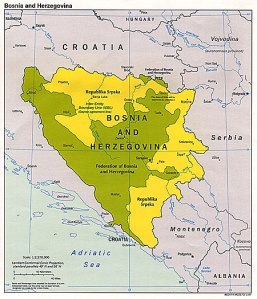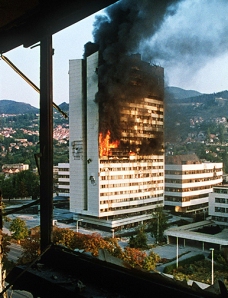Lesson misunderstood: NATO’s 1995 bombing in Bosnia
The belated but decisive intervention to end the war in Bosnia in 1995 is typically recalled as a U.S. foreign policy success, as the first notable international achievement of the presidency of Bill Clinton.
But as an essay at the online site of Foreign Policy points out, the Bosnia intervention yielded a lesson misunderstood — that overwhelming air power can produce swift and favorable policy outcomes. It is a lesson often misapplied.
The war in Bosnia was a savage conflict, the deadliest in Europe since the time of the Nazis. The conflict began in April 1992 and pitted ethnic Serbs against Bosnian Muslims and ethnic Croats. Serb forces seized about 70 percent of Bosnian territory in the early days of the war and laid siege to the capital, Sarajevo.
As I discuss in my forthcoming book, 1995: The Year the Future Began, the Clinton administration deferred for two years to Europeans in seeking a resolution of the conflict. Not until the Serb massacre of 8,000 Muslim men and boys at Srebrenica in July 1995 and the deadly shelling of a Sarajevo marketplace in late August was Clinton stirred to intervene.
Within two days of the marketplace shelling, NATO warplanes began an intensive and sustained bombing campaign against Serb military positions near Sarajevo. The aerial attacks ultimately forced the Serbs to lift their siege. By late November, U.S.-brokered peace talks, convened near Dayton, Ohio, produced a fragile yet enduring agreement that ended the war.
The Foreign Policy essay, written by Micah Zenko and posted today, notes that “the lesson of the limited utility” of the NATO air strikes against the Serbs in Bosnia “was not internalized in the White House.”
Zenko further writes:
“In March 1999, Clinton administration officials believed that a few days of cruise missile attacks and airstrikes against Serbian military forces would compel President Slobodan Milosevic to accept NATO’s demands that all Serbian security forces withdraw from Kosovo and international peacekeepers be admitted to enforce the peace. … This assumption was based upon a fundamental misunderstanding — that persists to this day — of the role that airpower played in 1995 in ending” the war in Bosnia.
More important than air strikes in ending the Bosnia conflict, Zenko notes, was a combined Muslim-Croat ground offensive, launched in early August 1995, that rolled back many of the territorial gains of Serbian forces. The offensive applied unprecedented pressure on Serb leaders to settle the conflict.
(Zenko adds that “the United States is back using force in Iraq on behalf of humanitarian and force protection goals, but with no apparent comprehensive strategy to achieve some clearly articulated end state.”)
Zenko’s observation about the unlearned lesson of air strikes in Bosnia in 1995 is certainly a telling one.
A related and perhaps an even more important consequence of the war in Bosnia was the interventionist impulse that was injected into U.S. foreign policy.
As I write in 1995, “Success in ending the brutal war in Bosnia was bracing: It emboldened U.S. foreign policy … rekindled ‘American Exceptionalism,’ and fired ambitions abroad. Bosnia was the first in a succession of ever-more ambitious military operations overseas.”
Those operations invariably were characterized by intensive bombing campaigns — of Serbia in 1999 and of Saddam Hussein’s Iraq in 1998. “Post-Dayton interventionism — and a willingness to deploy U.S. military power in pursuit of foreign policy objectives — lived on after the Clinton administration,” I further note in 1995. Like Clinton’s, the administration of George W. Bush was willing to apply military power abroad without securing prior endorsement of the United Nations.
Peter Beinart has aptly likened post-Bosnia interventionism to a “hubris bubble” that kept expanding as U.S. military success encouraged even more ambitious undertakings. “The more confident America’s leaders became in the hammer of military force,” Beinart wrote in his 2010 book, The Icarus Syndrome, “the more closely they looked for nails” in projecting force abroad.
The “hubris bubble” burst in the aftermath of the invasion of Iraq in 2003, a victim of the grinding insurgency that followed the toppling of Saddam’s Baathist regime.
More from The 1995 blog:
- Illuminating the Web: Netscape’s IPO of August 1995
- How important was Netscape?
- Recalling the ‘coolness’ of the early Web
- Anniversaries, controversies for Amazon.com
- What did the ’90s mean?
- The ’90s deserve better
- Why 1995?
- Talking 1995
- Welcome to The 1995 blog



Pingback: Hype and hoopla in a watershed year: Launching Windows 95 |
Pingback: So. Africa case like the O.J. Simpson trial in 1995? Only marginally |
Pingback: Recalling the ’95 case against lecherous Bob Packwood, whom Biden praised yesterday |
Pingback: The inevitablity of O.J. Simpson’s acquittal in 1995 |
Pingback: The big gap in Monica Lewinsky’s speech |
Pingback: It’s out: ’1995: The Year the Future Began’ |
Pingback: Looking back to 1995, the year the future began | The 1995 Blog
Pingback: Quirkiness on New Year’s, 1995: ‘Far Side’ farewell, errant Clinton prediction | The 1995 Blog
Pingback: Rolling out 1995 | The 1995 Blog
Pingback: Media fail: A 1995 subtext that’s familiar today | The 1995 Blog
Pingback: Watershed status of 1995 explored in book rollout at Newseum | The 1995 Blog
Pingback: Going ‘Majic’ for a brisk radio discussion about 1995 | The 1995 Blog
Pingback: ‘1995 was watershed moment in consumer technology,’ says Intel CEO | The 1995 Blog
Pingback: What ‘Time’ forgot in its look back to 1995 | The 1995 Blog
Pingback: 20 years on: Recalling O.J.’s wretched bestseller | The 1995 Blog
Pingback: Part One: Highlights of ‘1995’ interview with Reason.com | The 1995 Blog
Pingback: Part Two: Interview takes up scandal and the ’90s ‘zeitgeist’ | The 1995 Blog
Pingback: Downed pilot eludes Serbs: When Americans took notice of Bosnia | The 1995 Blog
Pingback: The 1995 massacre at Srebrenica and its effects on U.S. policy | The 1995 Blog
Pingback: Predator drone down — over Bosnia, 20 years ago | The 1995 Blog
Pingback: When war in Bosnia reached the beginning of its end | The 1995 Blog
Pingback: The UN at 50: Palaver, pomposity, and the newspaper ‘lead’ of the year, 1995 | The 1995 Blog